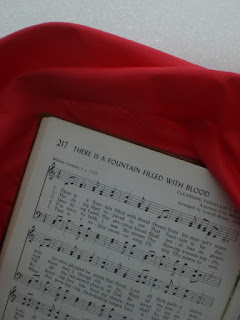These cheerful tinted daisies, a get-well gift from a friend, brightened our lives this winter. Tired of winter's white and gray, the blooms helped us anticipate the glorious colors of spring that seem to explode in May.
“May”-be you never thought about it, but the word “may” has more than one meaning. Besides a month name (supposedly related to Maia, the Roman goddess of spring and growth), in the English language it's a “helper verb.” More specifically, it's a “modal verb.” That sounds very important, but basically it implies a level of certainty or permission to the verb. Like: “You may go to bed”=permission to go. In contrast, “You can go to bed”=ability to go.
Enough English grammar. But this winter I found myself mentally “chewing”on a set of verses full of the helper verb “may.” The apostle Paul had written the church at Thessalonica, which had endured some bitter persecution. He reminded them of God's amazing love now and the wonderful future waiting in Heaven (boldface added):
Now may our God and Father himself and our Lord Jesus clear the way for us to come to you. May the Lord make your love increase and overflow for each other and for everyone else, just as ours does for you. May he strengthen your hearts so that you will be blameless and holy in the presence of our God and Father when our Lord Jesus comes with all his holy ones.(1 Thessalonians 3:12-13)
And in the conclusion:
May God himself, the God of peace, sanctify you through and through. May your whole spirit, soul and body be kept blameless at the coming of our Lord Jesus Christ. (5:23)
You can't miss the key words: love, be strong, be blameless and holy. And Who is the source of those life-changing attitudes? The One whose name follows the “may”: God the Father and "God of Peace". Paul's letter expressed the positive possibilities connected to faith in Christ, despite one's negative circumstances.
Maybe I “think” too much, but it does seem so right that May's re-birthing of the earth after winter (particularly for those of us in colder climates) shares the idea of hope and renewal with the “helper” (or modal) verb “may.” In our spiritual walk, Jesus is the One who can turn a “may” outcome into reality. It's a verb of blessing.
Several years ago I was elected to my local church's official board. We got to know each other and the pastor's vision for ministry through a weekend retreat. At its end, each of us sat in a chair while others gathered around to pray for us. With the laying-on of hands and earnest prayers, humility and gratitude washed over me.
I think a similar spirit was reflected through Paul's “may” statements of blessing in this passage. When, in Christian community, we focus on the “may's” of walking with Christ, we will draw closer to Jesus. We will be strengthened to make godly choices. We will have greater anticipation for the return of Jesus Christ.
May this be your reader take-away!






